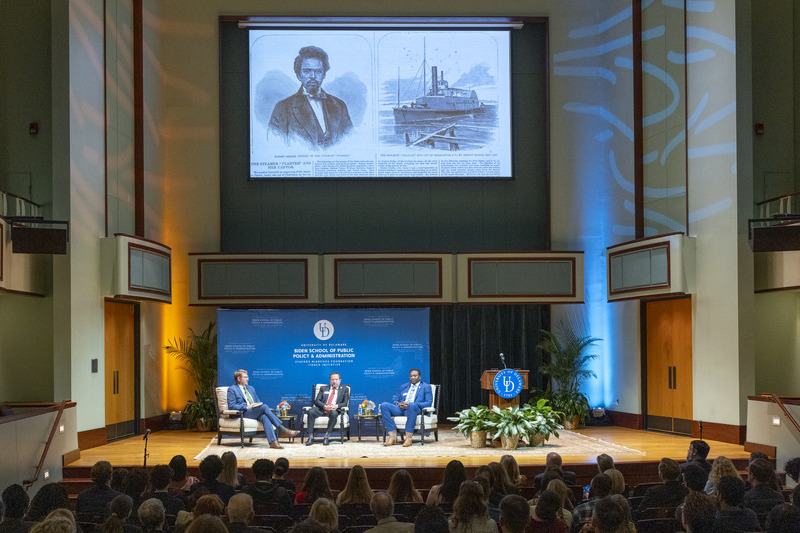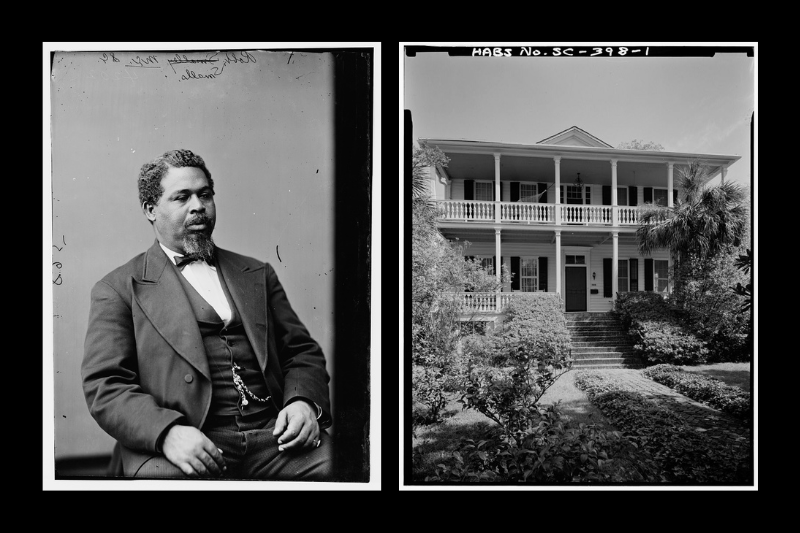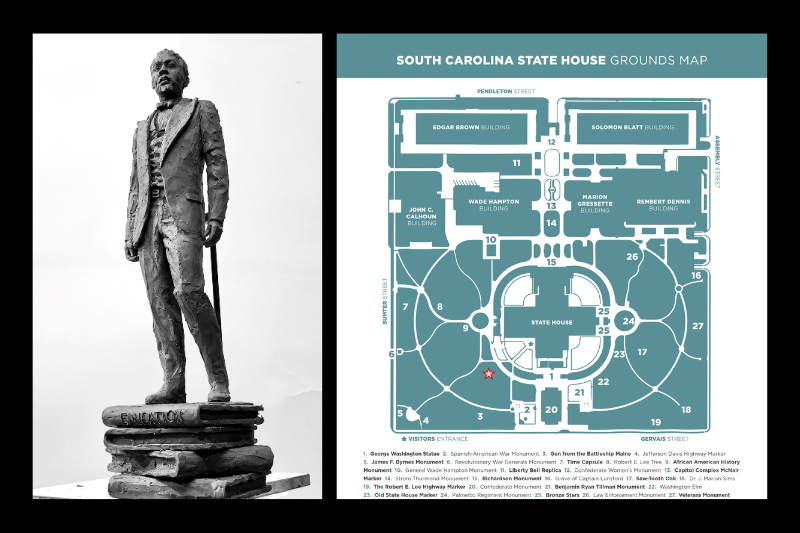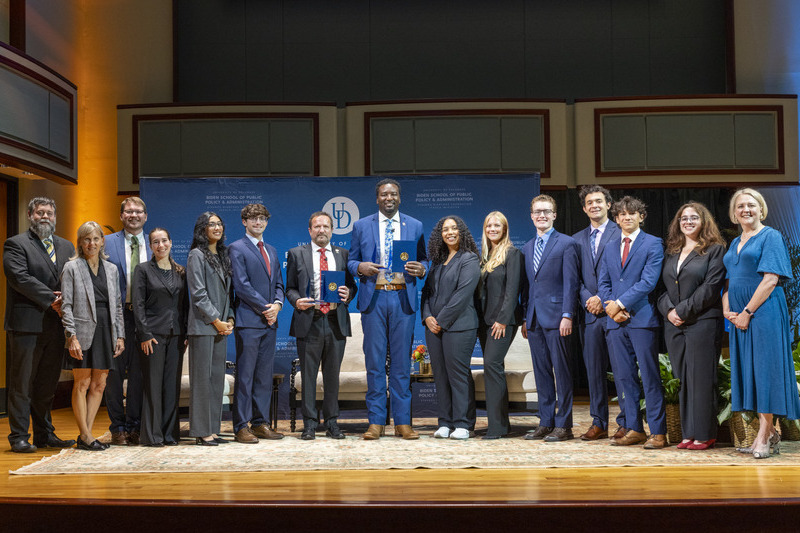


Crossing the aisle
Photos by Maria Errico and courtesy of the Robert Smalls Monument Commission and the Library of Congress September 30, 2025
Two South Carolina state representatives honored by UD for nonpartisan efforts to secure the first statue of a Black man at state house
Throughout the school year, students from various grade levels exit parked buses on Sumter Street in Columbia, South Carolina, in the shadow of the State Capitol building, eagerly awaiting a special field trip tour. The grounds of this picturesque legislative hall, punctuated with lush landscaping and grand architecture, will soon welcome the first statue of a Black man, one Robert Smalls (1839-1915), an escaped slave turned Civil War hero turned state lawmaker.
Once erected, it will join only five other statues, all white men with ties to the Confederacy and Jim Crow eras. Just like Smalls’ life story and legacy aren’t widely known beyond South Carolina state lines, the same is true of the backstory of the two individuals who made the future monument possible. Reps. Brandon L. Cox (R-SC) and Jermaine L. Johnson (D-SC) may reside on opposite sides of the aisle in their work, but that hasn’t kept them from making an impact.
In September, the two were honored with the 2025 Biden School of Civility in Public Service Award for their bipartisan efforts in passing South Carolina House Bill 4173 to recognize Smalls with his own monument. The award presentation and discussion, held on UD’s Newark campus, brought together University leadership, faculty, students and community members. The award, established by the Joseph R. Biden, Jr. School of Public Policy and Administration at the University of Delaware in 2022 and sponsored by the Stavros Niarchos Foundation (SNF) Ithaca Initiative, honors two public servants from disparate places on the political spectrum who successfully worked collaboratively for the public good.
“[The Civility Award] is a reflection of the values that we hold dear in the Biden School; things that we admire in our leaders—the kinds of things we expect our leaders to carry and to hold up,” noted Biden School interim dean Joseph Trainor during introductory remarks.

Moderated by Timothy Shaffer, Stavros Niarchos Foundation (SNF) chair of civil discourse and director of the SNF Ithaca Initiative, Cox and Johnson shared the story of their successful collaboration style and years-long effort to recognize Smalls officially.
“As we so often hear about the dysfunction of those in elected office and the deep polarization and partisanship that exists everywhere, it’s helpful to be reminded of what’s possible,” Shaffer said.
Laying the foundation
“I doubt that he could have gotten it done without me. I doubt that I could have gotten it done without him,” said Johnson, who was elected to the South Carolina House of Representatives in 2020. “It can only happen together, and we’ve got to show more of that.”
In 2023, then-freshman Representative Cox approached Johnson with the idea of introducing a bill to raise a monument for Smalls. This was not the first time a monument had been pitched. However, Johnson believes this time was successful because of the groundwork efforts in building relationships with his colleagues.
“I spend more time with Republicans than I do with Democrats, and the reason why I do that is there’s no sense in me sitting in a room with a bunch of Democrats who all agree on the same thing,” said Johnson, adding that Cox has worked to foster similar relationships with the Democrats, a shared quality Johnson believes made their efforts successful. The bill eventually passed through both the House and Senate with zero opposition.
Leaving a legacy
Smalls, born a slave in Beaufort, South Carolina, was sent to Charleston by his master at age 12, about 1851, to learn shipping and boating skills. In 1862, he commandeered a Confederate-contracted ship at Fort Sumter, sailing up to the Union blockade and successfully freeing himself, his family, and the ship’s crew in the process. After his escape, Smalls served in the U.S. Navy and eventually went on to the South Carolina State Senate as a five-term congressman and a fierce advocate for compulsory education laws.

“This is an equal representation statue,” Cox said. “We wanted to make sure that this monument is equal to every other monument on state house grounds,” noting that Georgia-based sculpture artist Basil Watson’s design is purposely similar to the others.
“This is going to be something where our children can be proud of where they come from,” Johnson said. “They can see somebody that they identify with. A lot of African American children that come to the State House, they don’t see any representation of themselves.”
Johnson, the first Black person (and youngest overall) elected to serve his district, makes it a point to greet and interact with school groups as much as possible at the state house.
“When I’m not there anymore, Robert Smalls will still be there forever,” Johnson said.

Escaping the echo chamber
Shaffer, who learned of the duo’s story by happenstance while listening to NPR’s “All Things Considered”, knew right away they had to be recognized as this year’s recipients. His closing question was to the point: “What would you say is the story of what you’ve done here?”
“We made history. And good, positive history is what we’ve made,” Johnson said. “I always tell people that I don’t reach across the aisle — I walk across the aisle.”
Cox chimed in: “Get outside of your own echo chamber.”
Cox and Johnson also received letters of recognition from Congress, presented by interim UD president Laura Carlson on behalf of U.S. Senator Lisa Blunt Rochester (D-DE).
“Thank you for caring about history, and recognizing and honoring our history,” Carlson said. Trainor added, “Thank you for the example that you’ve set for all of us and for the reminder that civility in public service is noble.”

Previous recipients include U.S. Congresswoman Sarah McBride (D-DE) and State Rep. Bryan Shupe (R-DE) in 2024, U.S. Senators Susan Collins (R-ME) and Tammy Baldwin (D-WI) in 2023, and Delaware State Representatives Michael Smith (R) and Valerie Longhurst (D) in 2022.
The Biden School’s SNF Ithaca Initiative brings young people together across UD’s campus and beyond, work that is needed now more than ever, particularly on college campuses.
To learn more, visit udel.edu/bidenschool/snfithaca
About the UD Biden School
Established in 1961 and named in 2018 for the 46th President of the United States, the Joseph R. Biden, Jr. School of Public Policy and Administration at the University of Delaware prepares students with the knowledge, skills and values necessary to engage in research and public service activities to improve the quality of life in communities around the world. Our faculty, staff, students and alumni create and use interdisciplinary, nonpartisan research and empirically based analysis to inform effective decision-making and policy and to improve leadership and administration. We partner with organizations from all sectors to discover and foster innovative and equitable solutions that promote civic virtues and democratic values.
Follow and engage with @UDBidenSchool on Facebook and Instagram and connect on LinkedIn to stay updated on the latest with research initiatives, academic activities and more.
About the SNF Ithaca Initiative
SNF Ithaca, an initiative of the University of Delaware's Joseph R. Biden, Jr. School of Public Policy and Administration, seeks to advance democracy by equipping students with the civil discourse and civic engagement skills necessary to navigate the mediated public square. Supported by the Stavros Niarchos Foundation (SNF), SNF Ithaca is named after the home of Odysseus—one of Greek mythology's greatest heroes. For Odysseus, Ithaca represents not only the beginning of a journey but the ultimate destination. Likewise, the SNF Ithaca Initiative serves as both the beginning of the Biden School students' journey toward becoming engaged and effective citizens and as the ultimate destination for students across the country to come together and work in partnership to develop policy solutions.
About the Stavros Niarchos Foundation (SNF)
The Stavros Niarchos Foundation (SNF) is one of the world's leading private, international philanthropic organizations, making grants to nonprofit organizations in the areas of arts and culture, education, health and sports, and social welfare. SNF funds organizations and projects worldwide that aim to achieve a broad, lasting, and positive impact for society at large, and exhibit strong leadership and sound management. SNF also supports projects that facilitate the formation of public-private partnerships as an effective means for serving public welfare. Since 1996, the Foundation has committed more than $3.3 billion through over 5,100 grants to nonprofit organizations in more than 135 countries around the world.
Contact Us
Have a UDaily story idea?
Contact us at ocm@udel.edu
Members of the press
Contact us at mediarelations@udel.edu or visit the Media Relations website

